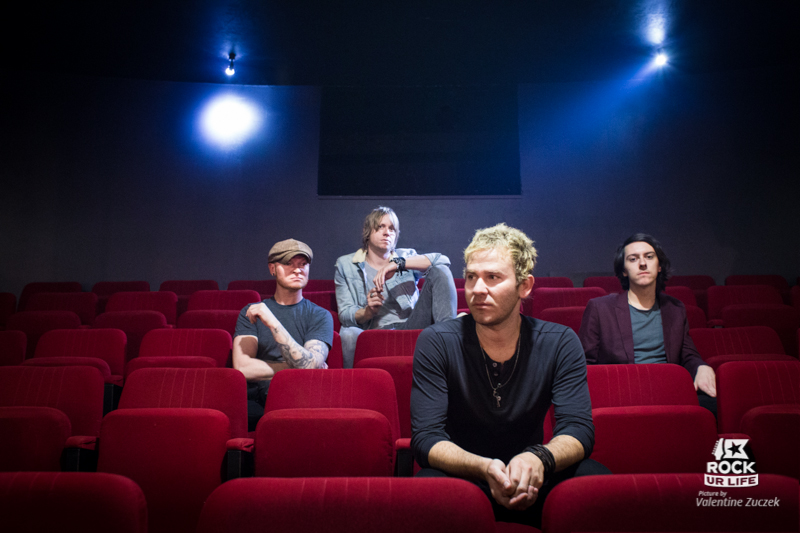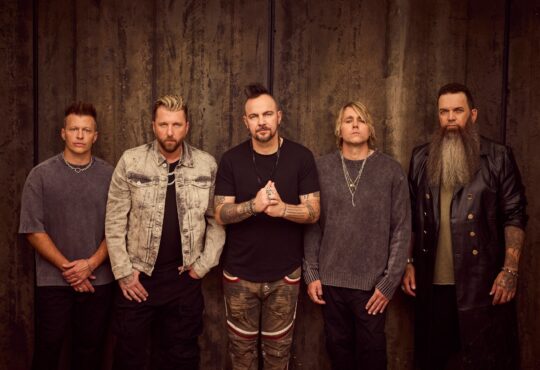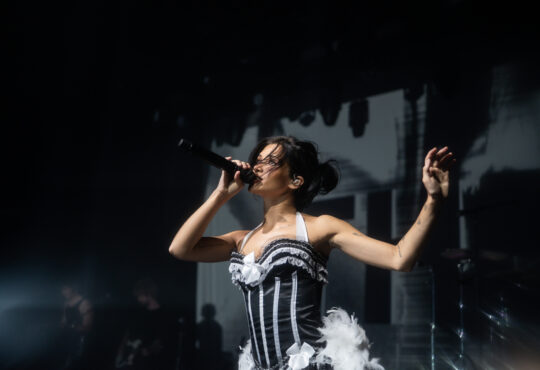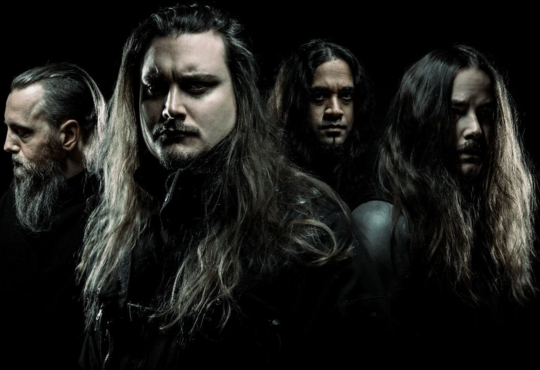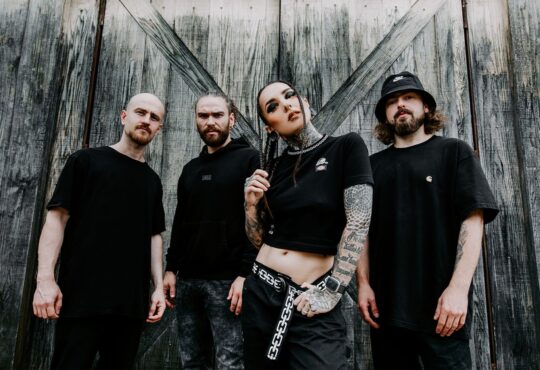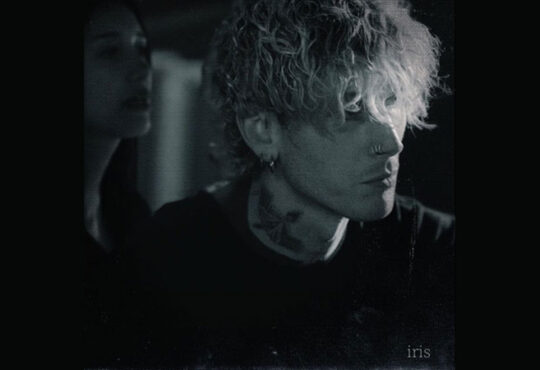When RockUrLife got offered the opportunity to do an interview with Lifehouse, we couldn’t refuse, especially knowing we’d be the only interview the band would give. Here’s what came out of our face to face with bassist Bryce Soderberg in their tourbus parked outside the Bataclan, a few hours before their first ever show in Paris.
Hi! How are you?
Bryce Soderberg (bass): I’m fantastic! How are you?
Fine! Thank you.
Happy to be in Paris?
B: Yes, very happy to be here. It’s my first time and so far it’s been just one morning but it’s been beautiful.
Did you have time to visit the city yet?
B: No! I’m planning tomorrow during the day to go and see the Louvre, Eiffel Tower and maybe if time the Army Museum.
Wow! After fifteen years, you’re finally here in France, for your first shows. What took you so long?
B: Yes! (laughs) I think it was a combinaison of things. Most of it is out of our control, we have a manager and a booking agent that does that sort of work for us and find business-wise which regions they think we should explore. We would always love to come here, but I think, this time, we took a risk, we booked a small venue, sold out very quickly. So we booked another one. And now after that, I think we’ll probably book much more shows in Paris.
Is playing these two shows a way for you to make up for the lost time?
B: We’re gonna try and make it that. I think it’s gonna be extra special for our fans because we do fifteen years and seven albums, there’s such a broad, diverse set that we can choose from. So I think there’s gonna be a lot of energy and excitement on mutual sides.
Because there’s a huge demand among your French fans here.
B: Yeah! And we didn’t realize. We have a couple of fans that have had websites such as Lifehouse France (ed: in fact, Lifehouse Network) and we have a couple of enthusiastic fans that made some noise online, that’s the only thing we have to gauge because we didn’t really have radio play in France. So now, after the sold out shows I think with France we’ve been established and we can come back more.
We heard that there’s gonna be a few surprises for you, tonight and tomorrow.
B: Surprises for us? I like that! Oh I’m excited, I like surprises!
You also play two different types of venues. Today here at Bataclan, and a smaller one tomorrow at Les Etoiles. What kind of venue do you prefer to play?
B: I love both for different reasons. Big shows, you kind of adapt towards a bigger audience, see bigger mouvements, there’s much more bigger excitement. When you have a small venue, it’s exciting too, because you have an intimacy, a lot of people there and there’s less people watching you. So it’s almost you under a bigger microscope. And I like both for different reasons.
Because in the United States, you play big arenas. Is the change of size kind of shock for you?
B: No! Like I said, we don’t have a firm footing here with our fanbase. A lot of the booking is out of our control. But it’s not a shock at all. We’re just establishing a new touring region and we’re grateful for wherever we get to play. No gig is too small.
So do you feel like you’re going back to the roots?
B: I think, musically, we went back to our roots if you’re referring to this album. I think so. We explored a lot of sonics and we got back to a little bit of musically wide, what our fans locked into us for in the first place. But yeah, with booking clubs, it’s going back to my roots too, it reminds me when I first started in the band and we were playing in front of nobody. Now to us, we’re more than happy, it’s not like going backwards for us, it’s a lot of fun.
Before this new album, Lifehouse had a break. That lasted for one and a half year, what happened during this time?
B: Well, three years ago, Jason told Rick and I that he wanted to make a solo album. Our last studio album “Almeria” didn’t do as well as we intended and we parted ways with our label. We were on a major label for our entire career. So I think we kind of burned out from all the touring that we’ve been doing for all that time. And we needed to kind of separate. I’ve started a solo project called Komox and gone into songwriting, Rick went to play with the Goo Goo Dolls for a while and Jason recorded his record. I think it was really a healthy thing for us musically, because we had something to bring back to the table when we knew that Lifehouse would never get back together and it did. Jason called Rick and I a year ago this month, and wanted to get back together, because he realizes that all the songs he was writing were very Lifehouse sounding. So we got back together, the break was very healthy for us, we kind of re-established and finished this record as a band and that’s the by product today.
With “Out Of The Wasteland” you decided to go independent and not to be signed to a major label anymore. Why?
B: We kind of wanted to just, like you said, get back to our roots, and kind of take the reins on our own. I’m in mid-thirties now, we’ve been in the business for a long time, we have kind of a firm grasp on the business, how it works. And we just kind of wanted to take the bull by the horns and do it ourselves, and not have an A&R guy influence us creatively or business-wise. Like I said, even coming here we are pushing, trying, make moves ourselves, rather than other outside sources. So and that we established a very good relationship with Kobalt, which is this independent record label that we’re going with, and it’s also an experiment for us too. There are a lot of advantages about major labels because they monopolize the radio industry, and they’ll get you played. They just do that. So there were pros and cons of it, but it’s a very much learning experience for us that has been fun for us.
Does the name of this album refer to that?
B: I think, yeah, most of that has to do with leaving, kind of getting out of that whole world and crossing into a new one. There’s kind of a rebirth for the band, and also musically. We went back to our roots with sonics but we also wanted to explore and show all the growth that we’ve achieved over the last fifteen years in this new record. So it’s a combination of the two that tightens.
With fifteen years in the music business, what are the main changes compared to fifteen years ago?
B: The biggest would be the records are not selling like they used to and second to that would be all the social media that kind of taking over now. There was no social media when we started in the music industry. And there were records that were selling and there was no online downloading, all of it is a double-edged sword, at the same token we have outreach with viral marketing that is reaching regions that we would never knew existed for us: Asia, here. So that was kind of the biggest adaptation for us and we’re there every step of the way. We’re always trying to conform, but not buying into what the music industry is doing, we’re aware of it, but we do our own thing and we keep our integrity and stay true to ourselves through the process.
We notice that you’ve got a strong relationship with your fans through social networks.
B: Absolutely, yeah. We’re trying to stay on top of that. It’s not like it was back when we were kids, where the closest you would get to your favorite band is to look at an album, like: “There’s Guns N’ Roses”. That’s all you see, now fans will pick out the setlist and help us pick out the setlist, or you joke around with them, you interact. And I think that’s really great with our fanbase because a lot of our music is interpreted or helps a lot of people with their lives and go through traumas or instances, relationships or whatever and we can kind of keep that connection with them and we have like a very strong, close, bond with our fanbase because of social medias.
And what do you thing about music streaming? We couldn’t find the new album on Spotify for example.
B: Again, as honest as I can be in this interview, I don’t agree with our album not being on Spotify right now. I think that our album should be on Spotify now, I’ve told our management that, but I think we wanted to kind of experiment the early stages and figure out if it was the right move to put out our music out for free right away.
Because it’s also on YouTube too.
B: Yes! Right now on my phone, I’m gonna make sure cause I haven’t been checking on that, it should be on Spotify.
And all your previous albums are on Spotify.
B: It is on Apple Music?
Yes!
B: It is? OK! Yeah, I mean, there’s three major music streaming services now, there’s Tidal, Apple Music and Spotify. There are some business things on our end that we do need to keep on, like I said, it’s our first independent release. So I’ll take note and try to fix that. Thank you!
Back to the new album, how was the recording process this time compared to your previous records?
B: We’ve been recording all our latest records at Jason’s studio which is in Agoura Hills, California. They’ve all been pretty similar, Jason and Jude, our manager, and producer, pretty much drive the train, or have driven the train on a lot of the creative process of Lifehouse for the majority of our career. This one in particular, Jason had a bunch of songs to show us and we really liked the direction that was going on and we wanted to get back together and we picked the songs and produced with them. This one, Jason had a lot of songs, 70 songs, started written for his solo project. And we just kind of looked at the best ones. It was a year ago, he picked one of the songs that I’ve written for my project Komox, called “Stardust”, that made the record too, and we just took it from there and finished up, wrote a couple more and that was the main difference with that. We never started a project with already so many songs under our belt.
If you had to choose three tracks to define best the record, which ones and why?
B: I would say “Flight”, it’s a really deep, inspired song that has to do with resilience and has to do with breaking through the other side and I think that’s one of our stable signature sounds and messages that we’re trying to portray into our songs. I still get chills from that song. Secondly, I would say “Hourglass”, which is the last song on the album. That song has a very cinematic quality and it was co-written with James Newton Howard, the famous film composer and that has a magical quality too, because that song was written 20 years ago, but never finished. And then Jason and Jude wrote it and finished it. That made the record very special. And then, I got to say “Hurricane”, also is a great song, and I say “Stardust”, because I wrote it. (laughs) But I’m joking! There’s a lot of really good songs.
And if you had to describe “Out Of The Wasteland” in three words?
B: I would say, “balanced”, “meaningful” and “growth”.
Speaking about the song “Hourglass”, how do you came to work with James Newton Howard?
B: Jason was introduced to James through Jude, our manager Jude and James have known each other for years and years. And he kind of resurrected their relationship and brought in Jason, that’s how he came about. And when Jason went in to wrote the song, I wasn’t there, but he said that James was in the middle of working on “Hunger Games”, so it’d see Jennifer Lawrence on the big screen. And he’ll be like “Hold on a second, I’m working on “Hunger Games””. That’s pretty cool!
One of your most popular ballads, “Everything” aired on the TV show “Smallville”, which is one of the main reasons you’re popular here in France. What’s the story behind it? We really hope to hear the full song at least once, if not at both of your shows. It would please a lot of fans out there for sure!
B: Yeah “Everything”, but also “You And Me”, were both real big songs because of “Smallville”. To answer your question, a lot of our music is portrayed throughout the world through licensing, which is getting on TV shows, movies and stuff like that. We’re grateful for that, because we reach fanbases we normally wouldn’t. And it’s been really huge applicate for us. “Everything” is a song that is an interpretative song. A lot of people have it played at their weddings, they interpreted as a romantic song. And a lot of people interpreted it as a spiritual song. Jason was raised missionary, very spiritual person, and I think that that song is kind of by the masses interpreted in a way that it means to someone. I wasn’t raised Christian but I’m a spiritual person as well, so when I listen to that song, I know it gives me the chills and I think it’s a beautiful thing.
Because we don’t really know if it’s about God or if it’s about a woman.
B: It’s up to you, man! I think that’s one of our formulas in Lifehouse, that has worked for us for a while: it’s not on purpose, it’s just the way it comes out with the songwriting.
We really hope to hear the full song tonight or tomorrow. Because this song is so special to French people.
B: Yeah? OK, I’ll let them know. Maybe we can pull it out.
It would please a lot of fans for sure, to do the full version.
B: OK. Because he’s been doing the half version.
Yeah, just one minute in the acoustic set.
B: Yeah, you know!
So let’s speak about these two Paris gigs. What can we expect from them?
B: Like I said, we have a fifteen year catalog, seven albums, and we’ve toured for fifteen years, so we kind of know what works, we know what our audiences come to see. Certain regions like you say, France knows “Everything” very well, a lot of regions are the same, but that’s a little different [between the] spots. But I think we have a broad consensus of what our fanbase wants to hear. We have a big chunk of our setlist that’s the hits, “You And Me”, “Hanging By A Moment”, of course we’re gonna play those. We have a couple of songs that we want to play for ourselves that normally we don’t. We just like to switch it up, but it’s entertainment and we have a lot of energy, we have a lot of passion, and we’re expecting that our fanbase since they haven’t heard us here before is gonna have the same back, so it’s gonna be really an interaction.
Will you change the setlist each night?
B: We have been changing it a little bit every night, like a few songs here and there. The first two songs of our set that we did in Amsterdam and Utrecht, I believe… or Groningen, in the Netherlands; we had completely different sets. And we were like: “Let’s make some tweaks”. Now I think we have like a really strong one that has from front to back been really balanced.
We notice that you haven’t changed a lot since Utrecht.
B: That’s true! Wow, you’ve been following us.
Yeah, you just changed the acoustic songs.
B: Yes. To be fair, we were planning on doing a lot of changes and completely separate setlists. But we found a formula that works and the majority of our fanbase has been switching every night, for different reasons, so we want it to really make the best show possible and keep the uncertainty in the acoustic set. Because there’s so many songs. And we could play whatever, but when we play songs like “Blind” or “Somebody Else’s Song”, we just don’t get the same reaction as we do when we play “All In All” or “Only One”. We’re trying to do what works but at the same time keep the art and the uncertainty in there as well.
“Blind” disappeared from the setlist.
B: Yeah, it did.
Here they like it a lot.
B: What other songs do you think we should play?
“Blind”, “Everything”, in fact all the songs from “Smallville”.
B: Yeah, “You And Me”, “Blind” and “Everything”, OK. Other ones?
“Whatever It Takes”.
B: OK, I’ll talk to them.
But “Everything” the full version will please a lot of people.
B: OK, definitely.
What do you think about the alternative rock scene nowadays?
B: Oh I love that you ask me that, because I’m a huge fan of the way the alternative scene has become. Especially the last three years. Rewind to 2012-2011, you had Foster The People, Awolnation, you have Imagine Dragons, bands from France like M83 and Phoenix. They come out and put out great records. I think it’s a great time for alternative music. We’re a little different type of alternative music, we’re in a different kind of category than those bands. But I’m a fan of the way that the alternative scene has become.
What bands/artists have you been listening to recently?
B: All the ones that I’ve mentioned for sure. But my music taste is always changing. To be honest with you, lately, I feel like the best albums that have come out this year have been hip hop records. I really like Kendrick Lamar’s new record, I really like Dr Dre’s new record “Compton”, and I think that there’s a lot of really good art in the lyrics and the flows in hip hop artists right now. That will probably change in a month, I don’t know! It’s just like right now, what I’ve been listening to. But I mean, all the other bands that I mentioned in the alternative scene for sure.
Anything you want to add, especially for your French fanbase?
B: I just want to express my gratitude. To be able to come to a place you’ve never been before, to have two sold out shows, and have as much love and enthusiasm as we have from the French fans, life doesn’t get better than that. So I’m OK.
Last question: as our website is called “RockUrLife”, what rocks your life guy?
B: What rocks my life? I just used the word but I would say gratitude and being present and appreciating is what makes everyday fun and makes you feel alive. That’s what rocks my life.
Thank you!
B: Thank you, sir.
Website: lifehousemusic.com




